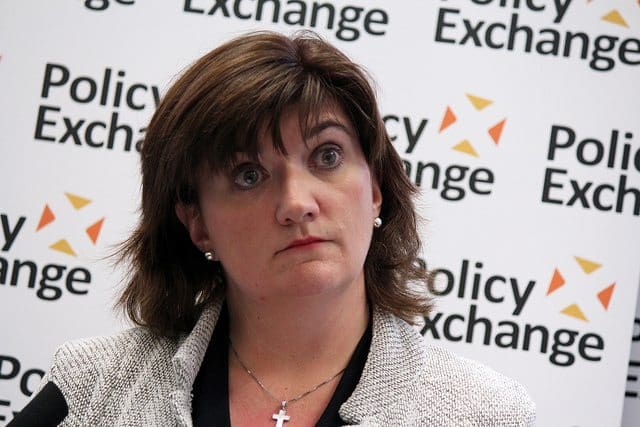Jeremy Corbyn just asked David Cameron to “leave the theatre and return to reality”. As the Prime MinisterThe reality Corbyn was referring to at Prime Minister’s Questions (PMQs) on 23 March was that Cameron has:
presided over a budget that unravelled in 2 days, and now contains a £4.4bn black hole.
This figure is the key economic concern facing the country in the next few months, and Corbyn really grilled the Prime Minister on the issue, asking:
Who’s going to pay for this black hole? Is it going to be cuts or tax rises? Where will the cuts fall? Where will the tax rises take place? £4.4bn has to be found from somewhere.
But instead of answering this big question, Cameron sought to distract the British public with a parliamentary pantomime of three acts, in which he focused on attacking his Labour opponents.
Act One
to cut Personal Independence Payment (PIP) support for disabled people. To add a particular sting to the question, he had quoted former Secretary of State for Work and Pensions Iain Duncan Smith, who said in his resignation letter last week that:
certain policies are enacted in order to meet the fiscal self-imposed restraints that I believe are more and more perceived as distinctly political rather than in the national economic interest.
But Cameron refused to focus on the self-imposed black hole in the government’s recent budget. Instead, he drew immense glee from talking about divisions in the Labour party.
Act Two
Later, in response to Corbyn’s question about who was going to pay for the black hole, Cameron once again focused on the Labour party rather than the issues at hand. He responded to the Labour leader by saying:
Suddenly the king of fiscal rectitude speaks
Firstly, this sarcastic comment ignored the fact that even right-wing organisations have praised pro-Corbyn economists like former Greek Finance Minister Yanis Varoufakis, Nobel Prize winner Joseph Stiglitz, and economics professor Thomas Piketty. Secondly, Cameron was again avoiding Corbyn’s question.
Act Three
Finally, Corbyn explained why it was so important for Cameron to answer his original question about the budget’s black hole, stressing the government’s big economic failures to date:
This budget downgraded growth, downgraded wage growth, downgraded investment. The chancellor’s failed on debt targets, failed on deficit targets, as the official figures have shown… The fiscal rule is quite simply failing. The Treasury Select Committee scrutinised the government’s fiscal rule. They couldn’t find any credible economist who backed it.
Predictably, Cameron continued to avoid the black hole in the government’s recent budget. Rather than clarifying how his party would meet its targets, Cameron again focused on attacking the Labour party, calling it:
a threat to the economic security of every family in our country
This scaremongering tactic seemed to ignore the fact that past Labour governments have consistently “borrowed less and repaid more than the Conservatives”, as pointed out recently by Tax Research UK’s Richard Murphy.
So where will the money come from?
Since Cameron refused to answer Corbyn’s question, let’s look at previous government behaviour to determine whether the missing money will be found through cuts or taxes.
First, it’s very unlikely that the government will meet its targets by taxing Britain’s wealthiest citizens and businesses, considering that:
- The biggest companies in the UK paid only 23% tax on their 2015 profits, while small and medium-sized companies were hit hard by government investigations into the underpayment of VAT.
- The government has reduced the taxes of massive banks like HSBC.
- The TUC has described the March budget as “much better for the better off”, and Richard Murphy has called it “a budget for the UK’s tax avoiders”.
- Finally, George Osborne announced in his budget that oil and gas taxes would be halved, in a move aiming to prop up a failing and unsustainable industry at a huge cost to the British taxpayer. At the same time, fossil fuel firms may have received a total of £6bn in government subsidies in 2015, and this is unlikely to change any time soon.
The most likely source of money for the government is privatisation and further cuts to public spending:
- The government is currently trying to privatise both the health and education systems by the back door. And although there is public resistance to these plans, they are likely to continue.
- The British people look set to lose nearly £22bn from George Osborne’s planned sale of our shares in the RBS bank. The current Chancellor has sold off around £60bn in public assets since 2010, and this pattern of behaviour is likely to continue.
- According to disability charities, government cuts to the employment and support allowance (ESA) have hit disabled people hard. And although the government has just taken a big hit with Iain Duncan Smith’s resignation and the resulting PIP U-turn, disabled citizens who’ve already suffered from other cuts probably won’t be convinced by its newfound opposition to further reduction in their support. Public sector pensions were also hit in the March budget, so pensioners may not be out of the woods either.
For now, the Conservatives have put off some awkward decisions and targets. The Independent’s Steve Richards suggests the Chancellor is simply:
keeping his fingers crossed, hoping something turns up between now and 2020 to help him meet his various targets and policy goals.
It may well be true that George Osborne doesn’t know exactly what he’s doing. But what he lacks in expertise, he definitely makes up for in passion. His fetish for privatisation and public spending cuts, for example, has been clear for all to see in the last six years.
So although the government refuses to clarify exactly how it will meet its economic targets and fill the black hole in its recent budget, all indicators suggest that we’re in for more cuts and more privatisation in the coming months and years.
See the full exchange between Cameron and Corbyn here:
Get involved!
– Support The Canary so we can continue to bring you what the mainstream media omits.
– Write to your MP and ask them to explain how the government plans to fill the black hole in its current economic plan.
Featured image via YouTube




















